What does fact checked mean?
At Healthfully, we strive to deliver objective content that is accurate and up-to-date. Our team periodically reviews articles in order to ensure content quality. The sources cited below consist of evidence from peer-reviewed journals, prominent medical organizations, academic associations, and government data.
The information contained on this site is for informational purposes only, and should not be used as a substitute for the advice of a professional health care provider. Please check with the appropriate physician regarding health questions and concerns. Although we strive to deliver accurate and up-to-date information, no guarantee to that effect is made.
Behavioral Signs of Low Blood Sugar
Low blood sugar, also known as hypoglycemia or low blood glucose, is a condition that occurs when the glucose level in the blood falls below normal. The vast majority of hypoglycemia occurs in people with diabetes, and is a result of the medication or insulin used for treatment 12. While blood glucose testing is the only way to definitively diagnose this condition, there are many behavioral signs that may indicate a person is experiencing hypoglycemia.
Early Behavioral Symptoms
The onset of hypoglycemia can be sudden 12. Early behavioral signs are generally mild and may be difficult to notice. People experiencing low blood sugar may appear shaky or act nervous. They may complain of hunger or look pale and sweaty. These symptoms result from a central nervous system response to low blood glucose levels. Recognizing and responding to these symptoms is important because the body, especially the brain, depends on glucose as its main source of energy to function.
- The onset of hypoglycemia can be sudden 1.
- People experiencing low blood sugar may appear shaky or act nervous.
Late Behavioral Symptoms
Does Sugar Give Kids Nightmares?
Learn More
If early symptoms of low blood sugar are not recognized and treated, behavioral signs can progress. This is due to a lack of adequate glucose for the brain. The hypoglycemic person may feel lightheaded, weak, dizzy or tired. He may seem confused or have difficulty concentrating. Others might notice that the person is slurring his speech or having mood swings, with possible crying or aggression. Sometimes these behaviors are mistaken for alcohol intoxication.
- If early symptoms of low blood sugar are not recognized and treated, behavioral signs can progress.
- Others might notice that the person is slurring his speech or having mood swings, with possible crying or aggression.
Hypoglycemia Unawareness
Some people with low blood sugar may experience no early behavioral signs. This condition, called hypoglycemia unawareness, occurs when there are frequent episodes of low blood sugar. The body becomes used to the low blood sugar levels and no longer reacts in a normal way. This condition can be dangerous because the early behavior signs are absent, thus preventing the low blood sugar from being identified and treated before it becomes severe.
- Some people with low blood sugar may experience no early behavioral signs.
- This condition can be dangerous because the early behavior signs are absent, thus preventing the low blood sugar from being identified and treated before it becomes severe.
Low Blood Sugar During Sleep
Diet for Hyperinsulinism
Learn More
Hypoglycemia during sleep, or nocturnal hypoglycemia, occurs most often in people with type 1 diabetes 2. While sleeping, a person with low blood sugar may have vivid nightmares or cry out. Upon waking, a person with nocturnal hypoglycemia may be irritable, confused or excessively tired. Because the behavioral signs of nocturnal hypoglycemia are not obvious and are different from those exhibited during waking hours, this condition is frequently not identified.
- Hypoglycemia during sleep, or nocturnal hypoglycemia, occurs most often in people with type 1 diabetes 2.
- Upon waking, a person with nocturnal hypoglycemia may be irritable, confused or excessively tired.
Warning
Regardless of when they occur, report any behavioral signs of low blood sugar to your health care provider for further evaluation. If low blood sugar is severe and left untreated, symptoms can progress to seizures, loss of consciousness, brain damage and even death.
Related Articles
References
- American Diabetes Association: The Barrier of Hypoglycemia in Diabetes
- American Diabetes Association: Hypoglycemia in Diabetes
- American Diabetes Association. Hypoglycemia (Low Blood sugar).
- American Diabetes Association. 6. Glycemic Targets: Standards of Medical Care in Diabetes-2020. Diabetes Care. 2020;43(Suppl 1):S66-S76. doi:10.2337/dc20-S006
- MyHealthAlberta.ca. Nocturnal Hypoglycemia. Updated July 25, 2018.
- Martín-timón I, Del cañizo-gómez FJ. Mechanisms of hypoglycemia unawareness and implications in diabetic patients. World J Diabetes. 2015;6(7):912-26. doi:10.4239/wjd.v6.i7.912
- Michigan Medicine. University of Michigan. Hypoglycemia (Low Blood Sugar) in People Without Diabetes. Updated November 6, 2018.
- Martín-Timón I, del Cañizo-Gómez FJ. Mechanisms of hypoglycemia unawareness and implications in diabetic patients. World Journal of Diabetes. 2015;6(7):912-926. doi:10.4239/wjd.v6.i7.912
- Service FJ, Cryer PE, Vella A. Hypoglycemia in adults: Clinical manifestations, definition, and causes. UpToDate. Updated March 14, 2017.
- American Diabetes Association. Hypoglycemia (Low Blood Glucose). Updated July 1, 2015.
- Healthwise Staff. Nocturnal Hypoglycemia. Healthwise. Government of Alberta. Updated March 13, 2017.
- Mayo Clinic Staff. Hypoglycemia. Mayo Clinic. Updated February 16, 2018.
Writer Bio
Macy Lucas is a registered nurse with her main focus in cardiology. She graduated with a Bachelor of Science in Nursing from Grand Valley State University.









